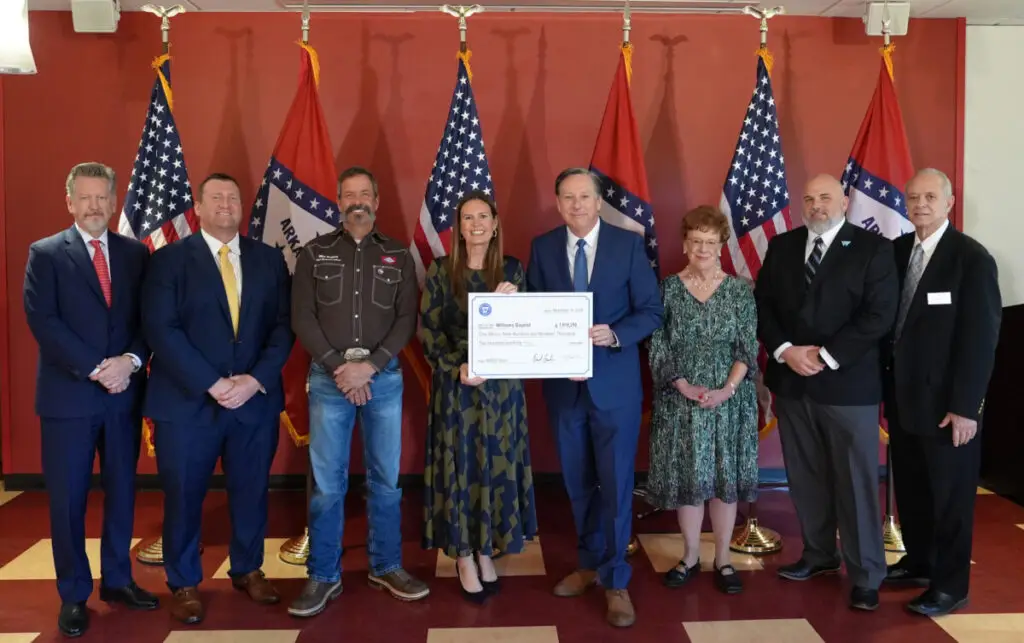Governor Sarah Sanders presenting the HIRED Grant award to Dr. Stan Norman. Left to right: Hugh McDonald, Secretary of the Department of Commerce; Cody Waits, Executive Director of Workforce Connections; Mike Rogers, Arkansas Chief Workforce Officer; Gov. Sanders; Dr. Norman; Sen. Jane English; Luke Colley, WBU Vice President for Advancement; J.R. Cox, Chair of the WBU Board of Trustees.
(Walnut Ridge, Ark.) – Williams Baptist University has been selected to receive a $1.9 million grant to help develop the workforce in Arkansas. Gov. Sarah Sanders announced Thursday that WBU is among the institutions chosen to receive grant funding, as part of a broader effort to support workforce development efforts aligned with the Arkansas Workforce Strategy.
WBU will utilize the grant funds through its Williams Works initiative, where students work their way to a university education. Specifically, WBU plans to develop programs in agricultural education and training.
“This grant empowers WBU to take a major step forward in educating our students for the careers of tomorrow,” said WBU President Dr. Stan Norman. “We want to be a partner with Gov. Sanders in preparation of the workforce for the state of Arkansas, and secondly we want this funding to strengthen and expand our programmatic and workforce training in Williams Works.”
Norman said Williams plans to use the grant funds to develop an agriculture program in business and technology. The program will prepare students for careers in “precision agriculture,” a technology-based field identified by Governor Sanders’s staff as an area of industrial growth in the state of Arkansas.
Another industry targeted for workforce training and growth is food production. WBU hopes to apply a portion of the grant toward programs in food production and management. The university plans to develop facilities and curriculum for teaching food safety and sanitation, business operations, inventory management, food production processes and food sustainability, among other areas.
Through Williams Works, WBU has established Eagle Farms, which operates a produce farm and meat processing plant. Those operations will be utilized in the school’s food production and management program.
“We want to be a workforce university, with a robust expression of all facets of university programs and activities. We are also mindful of the need to prepare our students for the workforce they will be entering,” Norman said. “There has been a lot of discussion within our accrediting body for colleges and universities to expand their educational initiatives to include professional credentialing and certification programs. We want to be on the forefront of that movement.”
The grants were awarded as part of the Higher Industry Readiness through Educational Development (HIRED) program, established by the Workforce Initiative Act of 2015. Nineteen organizations in Arkansas, including WBU, received a total of $48 million in grants in the Track 2 portion of the HIRED grants program, administered by the Arkansas Department of Commerce and Arkansas Workforce Connections.
“The great thing about the HIRED program is that it’s not just education-focused – it’s also closely aligned with Arkansas’ fastest-growing industries,” said Gov. Sanders. “The $48 million we’re announcing through the HIRED grant program will help provide a solution to Arkansas’ business leaders who are seeking more qualified, skilled, hardworking employees to grow their companies.”
The HIRED grants are intended to provide funding for state and regional industry-driven partnerships and data-driven education and workforce training programs. Funding for the grants comes from Arkansas Workforce Initiative grant funding and American Rescue Plan Act (ARPA) funds.
Students in WBU’s Williams Works initiative work an average of 16 hours per week through the fall and spring semesters, and in return have their full tuition and student service fees covered. Additionally, students can apply to work full-time through the summer months to cover the following year’s room & board. Students are assigned to a variety of workstations, both on campus and in their community.

